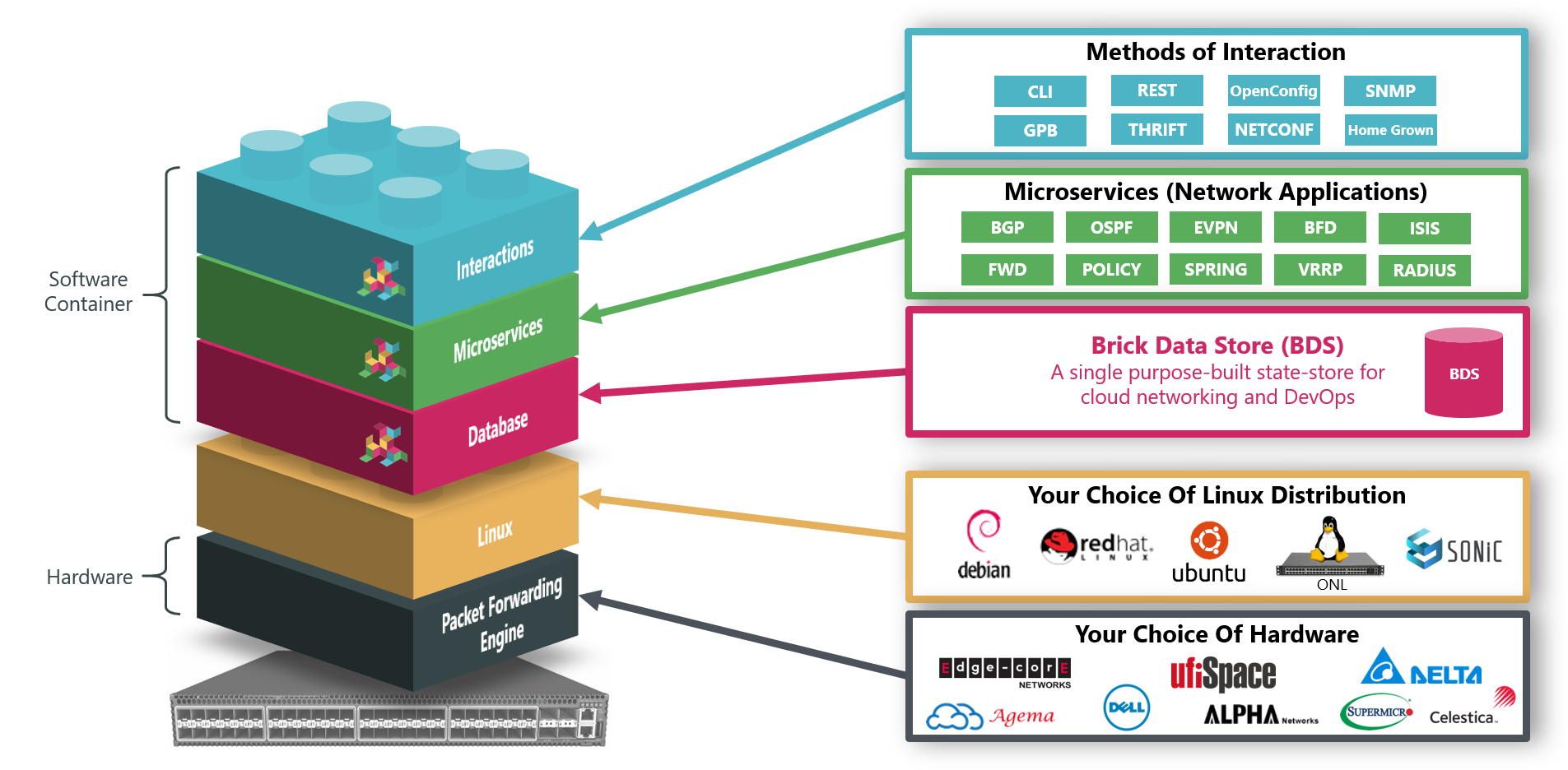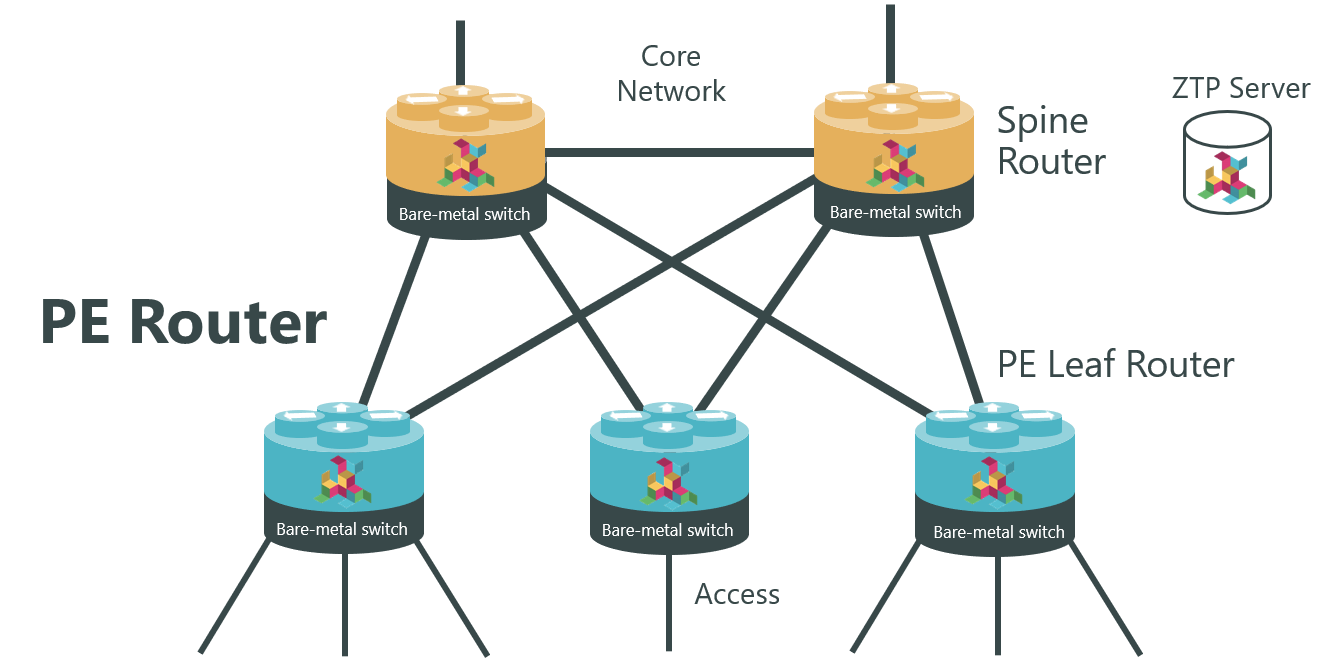L2 Metro Ethernet Switch Software
RtBrick Multiservice Edge routing software can also emulate L2 Metro Ethernet Services.
It is delivered as a software container, packaged out-of-the-box with the Open Network Linux (ONL) provided by the hardware SKU manufacturers, which handles peripherals such as LEDs, temperature sensors, and so on. There are no dependencies on either the kernel or the hardware platform components, so RtBrick’s containers can be run on the Linux version of your choice. The RtBrick PE Router software can run on either an x86 server, or for most carrier-scale deployments, on low-cost but powerful bare-metal switches.

Benefits
RtBrick’s disaggregated PE Router delivers some significant benefits compared to traditional monolithic systems:
- · Greater agility – you can add new services in weeks rather than years
- · Reduced risk – no more vendor lock-in and a simpler automated operating environment
- · Cloud cost-levels – leverage low-cost merchant silicon and automate your operations like a ‘cloud-native’
Agility
ZTP (Zero-Touch-Provisioning) ensures that each switch is booted, provisioned and operational without requiring manual intervention. This means that you can add capacity, or roll-out new service features, in a matter of minutes instead of days or weeks. The software itself is developed using Agile methodologies so that features are rapidly prototyped and implemented, reducing the time-to-market for new services.
Reduced risk
RtBrick’s PE Router software is compiled for your specific use-case, using only the features you need. With an order of magnitude fewer lines of code, and a single state database rather than hundreds, the whole system is less complex, less prone to bugs and has much faster restart times. It also allows you to pick and mix between the latest silicon and the best available software.
Cloud cost-levels
Now you can take advantage of the low cost-points of merchant silicon on your choice of bare-metal switches, significantly reducing your capex bill. And opex costs can be reduced by automating your operations, using ZTP and the same Web2.0 operational tools that the ‘cloud-natives’ use to run their infrastructure.
Deployment Options
The PE router's capacity can be scaled down to a single RU bare-metal switch or provided in a scale-out architecture called a Point-Of-Deployment (PoD).

Example of a Single RU bare metal switch
A large-scale PoD consists of a layer of PE Leaf Routers and a layer of Spine Routers in an auto-provisioned CLOS topology. The PE Leaves deliver service management functionality and the Border Leaves provide connectivity to the core of the provider network. The leaves can be scaled out horizontally to increase the number of customer connections supported on the PoD, providing a pay-as-you-grow architecture. For smaller PE routers, Spine and Leaf functionality can be collapsed onto a single hardware platform.

Large scale disaggregated L2 Ethernet Switch
L2 Cross Connect (L2X) allows your RtBrick PE Router to also act as a service cross-connect, routing each customer connections to the appropriate network infrastructure, and extending the life of your high-cost legacy routing systems, for example.
Management and Operations
Along with a traditional CLI, more ‘cloud-native’ means of interactions are also supported, such as RESTCONF. RtBrick’s Management System, RBMS, takes this a step further, by providing network level workflows such as Image Lifecycle Management, Network Upgrades and Event and Log Management. RBMS actions are available through REST APIs making them easy to integrate into existing OSS systems. RBMS provides a single point of interaction for operations staff – from provisioning and management to monitoring and debugging.The result is a PE Router that can be managed using the latest Web2.0 tools through a ‘single pane of glass’, with Zero-Touch-Provisioning.
Features
The features supported by RtBrick FullStack are expanding all the time, because it's much faster for us to add and test new features than it is using a traditional monolithic code base. Currently supported features include:
| Features * | PE Router |
| General | |
| Routing Policy | ✔ |
| LDP | ✔ |
| L2X | ✔ |
| BGP | |
| IPv4 | ✔ |
| IPv6 | ✔ |
| LU-v4 | ✔ |
| LU-v6 | ✔ |
| VPNv4 | ✔ |
| VPNv6 | ✔ |
| Add-path | ✔ |
| Multi-path | ✔ |
| Multi-hop | ✔ |
| Segment Routing | ✔ |
| 4-Byte AS | ✔ |
| TCP-AO | ✔ |
| ISIS | |
| IPv4 | ✔ |
| IPv6 | ✔ |
| Segment Routing | ✔ |
| OSPF | |
| IPv4 | ✔ |
| IPv6 | |
| Segment Routing | ✔ |
| Forwarding Plane | |
| VPP | ✔ |
| ACLs (IPv4/6, L2) | ✔ |
| QoS (policing, scheduling, queuing, hierarchical) | ✔ |
| Operations | |
| ResmondD (RtBrick resource monitoring application) | ✔ |
| CLI | ✔ |
| Inband Management | ✔ |
| ZTP Provisioning | ✔ |
| RBMS (RtBrick Management System) | |
| Rules Engine | ✔ |
| Topology Discovery & Inventory | ✔ |
| REST API | ✔ |
| Microservice | ✔ |
| Dynamic Service Selection | ✔ |
* may include some road-map features
Compatible Hardware
RtBrick's Full Stack routing software can operate on many bare metal switches, depending on your performance and port count requirements. You can find details of compatible hardware here.
